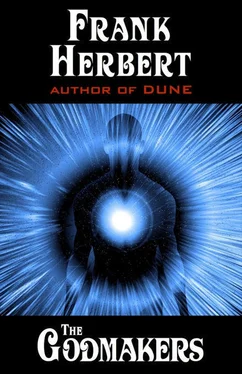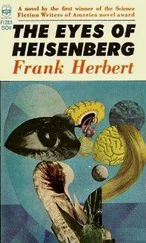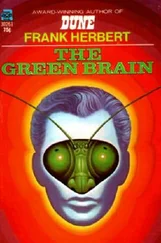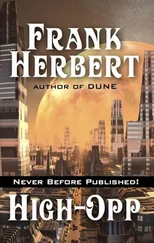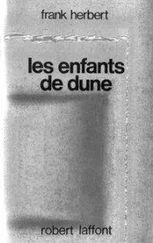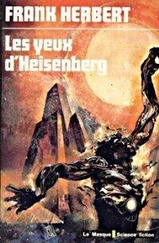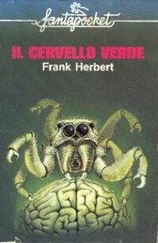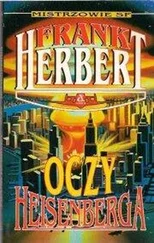A new kind of awareness remained. Orne knew that if he willed it, Bakrish would be cast into the deepest torture pit of Mahmud’s nightmares. He had only to wish it.
Why not? he asked himself.
Then again: Why? Who was he to make such a decision? Had Bakrish earned eternity of Mahmud’s hate? Was Bakrish the one who had set out to destroy the I-A?
Bakrish was a minion, a mere priest. The Abbod Halmyrach, however…
Groaning and creaking filled the cell. A tongue of flame leaped out of the darkness above Orne, a fiery lance poised and aimed, casting a ruddy glow on the cell’s walls.
Prescient warning clawed at Orne’s stomach.
Who was a proper target for Mahmud’s fanatical violence? If the wish were made, would it strike only one target? What of the one who wished this thing? Was a backlash possible? Would I join the Abbod in hell? Orne possessed the certain awareness that he could in this instant do a dangerous and devilish thing. He could cast a fellow human into eternal agony.
What human and why? Was possession of an ability the license to use it? He found himself revolted by the momentary temptation to do this thing.
No human deserved that. No human ever had deserved it.
I exist , he thought. That is enough. Do I fear myself? The dancing flame winked out of existence. It left the darkness and its hissings, scrabblings, slitherings.
Orne felt his own fingernails trembling against the floor. Realization swept over him.
Claws!
He stilled his hands, laughed aloud as the claw sound stopped. He felt his feet writhing with involuntary efforts at flight. He stilled his feet.
The suggestive slithering vanished. Only the hissing remained.
He realized it was his own breath fighting its way through his clenched teeth.
Laughter convulsed him.
Light!
Brilliant light flared in the cell.
With sudden perversity, Orne rejected the light and darkness returned—a warm and quiet darkness.
He knew the psi machine around him was responding to his innermost wishes, to those wishes uncensored by doubting consciousness, to those wishes in which he had faith.
I exist.
Light was his for the wishing, but he had chosen this darkness. In the sudden release of tensions, Orne ignored Bakrish’s warning, got to his feet. Being on his back had made it easier to understand his own innermost passivity, the assumptions and acceptances which clouded his being. The clouds were gone now.
Orne smiled into the darkness, called out: “Bakrish, open the door.”
A psi probe peered into Orne, slow and ponderous. He recognized Bakrish in it.
“You can see I have faith,” Orne said. “Open up.”
“Open it yourself,” Bakrish said.
Orne willed it: Show me, Bakrish.
A sandy scraping filled the cell. Light fanned inward from the side as the entire wall opened. Orne looked out at Bakrish, a shadow framed against light like a robed statue.
The Hynd stepped forward, jerked to a halt as he saw Orne standing in darkness. “Did you not prefer the light, Orne?”
“No.”
“But you’re standing, unafraid of my warning. You must have understood the test.”
“I understood,” Orne agreed. “The psi machine obeys my uncensored will. That’s faith, the uncensored will.”
“You understand and still choose the dark?”
“Does that bother you, Bakrish?”
“Yes.”
“For the moment, I find that useful,” Orne said.
“I see.” Bakrish bowed his shaven head. “I thank you for sparing me.”
“You know about that?” Orne was surprised.
“I felt the flames and the heat. I smelled the burning. I sensed my own screams of agony.” Bakrish shook his head. “The life of a guru on Amel is not an easy one. There exist too many possibilities.”
“You were safe," Orne said. “I censored my will.”
“Therein lies the most enlightened degree of faith,” Bakrish murmured. He brought up his hands, palms together and once more bowed to Orne.
Orne stepped out of the dark cell. “Is that all there is to my ordeal?”
“Oh, that was merely the initial step,” Bakrish said. “There are seven steps: the test of faith, the test of the miracle and its two faces, the test of dogma and ceremony, the test of ethics, the test of religious ideal, the test of service to life, and the test of the personal mystique. They do not necessarily fall in that order and sometimes are not distinctly separated.”
Orne tasted a sense of exhilaration, sensed that his prescient awareness of peril had receded. He said: “Let’s get on with it.”
Bakrish sighed, said: “Holy Rama defend me.” Then: “Very well, the two faces of the miracle; that is indicated next.”
The sense of peril came alive once more in Orne. He fought to ignore it, thinking: I have faith in myself. I can conquer my fear.
Angrily, Orne said: “The sooner we get through this, the sooner I see the Abbod. That’s why I’m here.”
“Is that the only reason?" Bakrish asked.
Orne hesitated, then: “Of course not. But he’s the one who’s putting the heat on the I-A. When I’ve solved all of your riddles, I’ll still have him to solve.”
“He is the one who summoned you, that is true,” Bakrish said.
“I thought of casting him into hell,” Orne said.
Bakrish paled. “The Abbod?”
“Yes.”
“Rama, guard us!”
“Lewis Orne guard you,” Orne said. “Let’s get on with it.”
The pattern of massive lethal violence, that phenomenon we call war, is maintained by a guilt-fear-hate syndrome which is transmitted much in the manner of a disease by social conditioning. Although lack of immunity to this disease is a very human thing, the disease itself is not a necessary and natural condition of human existence. Among those conditioned patterns which transmit the war virus you will find the following—the justification of past mistakes, feelings of self-righteousness and the need to maintain such feelings…
—UMBO STETSON, Lectures to the Antiwar College
Bakrish stopped before a heavy bronze door at the end of a long hall down which he had guided Orne. The priest turned an ornate handle cast in the form of a sunburst with long projecting rays. He threw his shoulder against the door and it creaked open.
He said: “We generally don’t come this way. These two tests seldom follow each other in the same ordeal.”
Orne stepped through the door after Bakrish, found himself in a gigantic room. Stone and plastrete walls curved away to a domed ceiling far above them. Slit windows in the high curve of the ceiling admitted thin shafts of light that glittered downward through gilt dust. Orne’s gaze followed the light down to its focus on a straight wall barrier about twenty meters high and forty or fifty meters long. The wall was chopped off and appeared incomplete in the middle of the immense room, dwarfed by the space around it.
Bakrish circled around behind Orne, closed the heavy door. He nodded toward the barrier wall. “We go there.”
He led the way; Orne followed. Their slapping sandals created an oddly delayed echo. The smell of damp stone was a bitter taste in Orne’s nostrils. He glanced left, saw evenly spaced doors around the room’s perimeter—bronze doors appearing identical to the one they had entered. Looking over his shoulder, he tried to pick out their door. It was lost in the ring of sameness.
Bakrish came to a halt about ten meters from the center of the odd barrier wall. Orne stopped beside him. The wall’s surface appeared to be smooth gray plastrete, featureless, but menacing. Orne felt his prescient fear increase as he stared at the wall. The fear came like the surging and receding of waves on a beach. Emolirdo had interpreted this as infinite possibilities in a situation basically perilous.
Читать дальше
